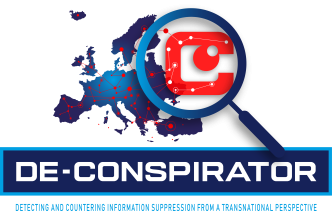Detecting and Countering Information Suppression from A Transnational Perspective (DE-CONSPIRATOR)
Aim
Description
The project explores:
a) how Russia and China pursue information-suppression tactics in the EU and its partner countries (PCs) and how they construct/strategize these tactics;
b) which cases of FIMI have been the most impactful in EU countries and PCs, and how to measure the importance of future FIMI 'attacks';
c) which transnational dissemination and consumption networks have been contributing to the success of foreign information-suppression attempts within the EU;
d) the social and psychological drivers of which forms of FIMI succeed;
e) how can the existing legal, regulatory, and diplomatic frameworks in the EU (such as the GDPR or Digital Services Act) and PCs be improved to build greater resilience against such efforts;
f) opportunities and pitfalls of platform-level governance that could be improved to improve collective EU and PC defences against FIMI, in an interdisciplinary, multi-method, interconnected and multinational manner.
The value of this research linkage is:
- better understanding FIMI from the perpetrator side for more accurate defense;
- why trans-European information networks knowingly or unknowingly (misinformation vs disinformation) adopt semantic narratives of certain FIMI attempts and contribute to their domestic and Europe-wide dissemination;
- synoptically evaluate and methodologically sharpen existing research on cognitive and societal drivers of which topic and content types remain most salient in ‘successful’ FIMI cases;
- approach the research gaps that exist in this field by providing an interdisciplinary focus by combining political communication, international relations, social psychology, area studies (EU, China and Russia), security studies and computational social science;
- present an expanded solution space by creating an interconnected menu of legal, regulatory, diplomatic and technological policy and regulatory options to help counter FIMI in a more coordinated and targeted fashion.
Project coordinator
- Özyeğin University (OZU), Turkey
Project partners
- Istituto Affari Internazionali (IAI), Italy
- Rīga Stradiņš University (RSU), Latvia
- Rijksuniversiteit Groningen (RUG), Netherlands
- Vrije Universiteit Brussel (VUB), Belgium
- Ruprecht-Karls-Universitaet Heidelberg (UHEI), Germany
- White Research SRL (WR), Belgium
- Institute for Advanced Behavioral Research (AdCogito), Lithuania
- Centre for Economics and Foreign Policy Studies (EDAM), Turkey
- Center for the Study of Democracy (CSD), Bulgaria
- Barcelona Centre for International Affairs (CIDOB), Spain
- Georgia's Reforms Associates (GRASS), Georgia
- University of Amsterdam (UvA), Netherlands





